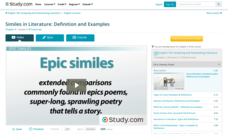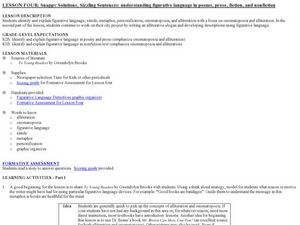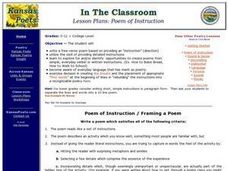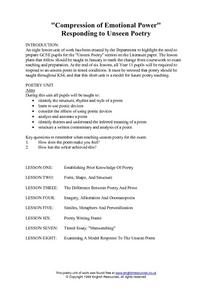Curated OER
Similes in Literature: Definition and Examples
Be as romantic as a poetic. Appear as clever as Einstein. Wow others with your powers of observation by using similes to point out the similar aspects in two different things. This short video focuses on similes found in Shakespeare and...
Curated OER
Lots of Lessons from Aesop
Aesop’s Fables offer young learners an opportunity to study figurative language. After reviewing theme, simile, alliteration, and metaphor, model for your pupils how to identify examples of these devices in the fable. Class members then...
Curated OER
Snappy Solutions, Sizzling Sentences
An examination of the figurative language in Gwendolyn Brooks’ To Young Readers challenges your writers to think about the richness of language. Ask your class why Brooks says, “Good books are bandages.” This discussion of alliteration,...
Curated OER
It's All Poetry to Me!
Fourth graders explore language arts by analyzing poetry styles. In this writing analysis lesson, 4th graders read several sample poems in class and identify similes, metaphors and other figurative language within them. Students analyze...
Curated OER
Poetic Devices
Introduce middle schoolers to poetic devices with a lesson that asks them to find examples of alliteration, anaphora, onomatopoeia, metaphors, similes, and personification in various poems. Young scholars craft examples of these poetic...
Academy of American Poets
The African American Experience
Disrespect can be as subtle as a frown or a turn of a head. To prepare for a study of Toi Derricote's poem "The Weakness" class members create wordless skits that demonstrate subtle or not so subtle signs of disrespect. After a...
Learning for Justice
Maya Angelou
Maya Angelou's poem, "Still I Rise", offers young scholars an opportunity to consider how poets use literary devices to create powerful messages. After a close reading and discussion of the poem, class members reflect on how they can...
Curated OER
Can You Figure Language?
Eighth graders study similes and metaphors and how to explain and create them. After a lecture/demo, 8th graders access websites and worksheets imbedded in this plan to create their own writing.
Curated OER
Simile Stories
Fourth graders view song lyrics and identify similes in the song text. In this similes lesson, 4th graders define and identify similes on a worksheet. Students write their own similes using various adjectives.
Curated OER
Searching for Images in Poetry
Students are introduced to the concepts of similes, metaphors and personification. In groups or individually, they read different poems identifying the similes, metaphors and instances of personification in each. They record all answers...
BBC
The Role of a Monarch (key stage 2 and 3)
What makes a good monarch? Elementary and middle schoolers examine popular symbols of the British monarchy before designing a television advertisement about the qualities needed in a monarch. Next, they write poems using metaphors and...
Curated OER
Poem of Instruction
Young scholars write a free-verse poem and utilize the skill of providing detailed instructions. identify opportunities to create poems from simple, everyday verbal or written instructions. They study everyday language that has merit as...
Curated OER
Comparatively Speaking
Students practice creating similes and metaphors together as a class. Individually students create similes and metaphors and illustrate them.
Curated OER
Haiku Wrap Up
Students create a haiku about the land formations they've studied. In this haiku lesson, students identify the metaphor and meaning of a given haiku, brainstorm comparisons for a landform photo as a class and choose one to use in a...
Curated OER
Cluing into Symbols Robert Frost
Students use the Internet and video to discover how find evidence in poetry in order to discover the theme(s) of the poems. They are able to define poetic devices like simile, metaphor and repetition. Students identify themes in...
Curated OER
Language Arts: Stylistic Devices
Students are able to define given literary terms, such as metaphor, simile, imagery, personification, symbolism, etc. They are able to identify the use of literary elements in a given text. Students are able to interpret weather...
Maryland Department of Education
A Raisin in the Sun and Dreams Deferred
To conclude a study of A Raisin in the Sun and to prepare for a visit to the Lewis Museum, class members analyze Langston Hughes' poem "Harlem." Learners then draw connections to characters in the play and to their own experiences...
Curated OER
Writing a poem
Students imagine themselves someplace -- the beach, a mountain top, a city street -- anywhere.
Curated OER
A Simile and Metaphor Lesson
Students use their knowledge of similes and metaphors to analyze poetry. In this poetry and language lesson, students read examples of similes and metaphors and write their own examples that describe their city, television, or an era in...
Curated OER
Similes and Metaphors
Students explore similes and metaphors. They discuss and define similes and metaphors, identify the similes and metaphors in two poems, and create three original examples of each.
Curated OER
Poetry and the American Presidents
Fifth graders choose a poetry activity in order to focus their research about American presidents.
Curated OER
Figurative Language
What is figurative language, and why do we use it? Introduce your high schoolers to some examples and discuss the importance of including this element in your writing. After studying a text and searching for examples, writers will...
Curated OER
Ballad
Young balladeers analyze examples of ballads and generate a list of common traits (story, quatrains, rhyme schemes, refrains, etc.), then identify these traits in Robert W. Service's "The Cremation of Sam McGee" and a ballad written by...
Curated OER
"Compression of Emotional Power"--Responding To Unseen Poetry
Eleventh graders identify the structure, rhythm and style of a selected poem, experience utilizing poetic devices and analyze an annotated poem. They evaluate the themes and inferred meanings to a variety of poems from their textbooks.

























